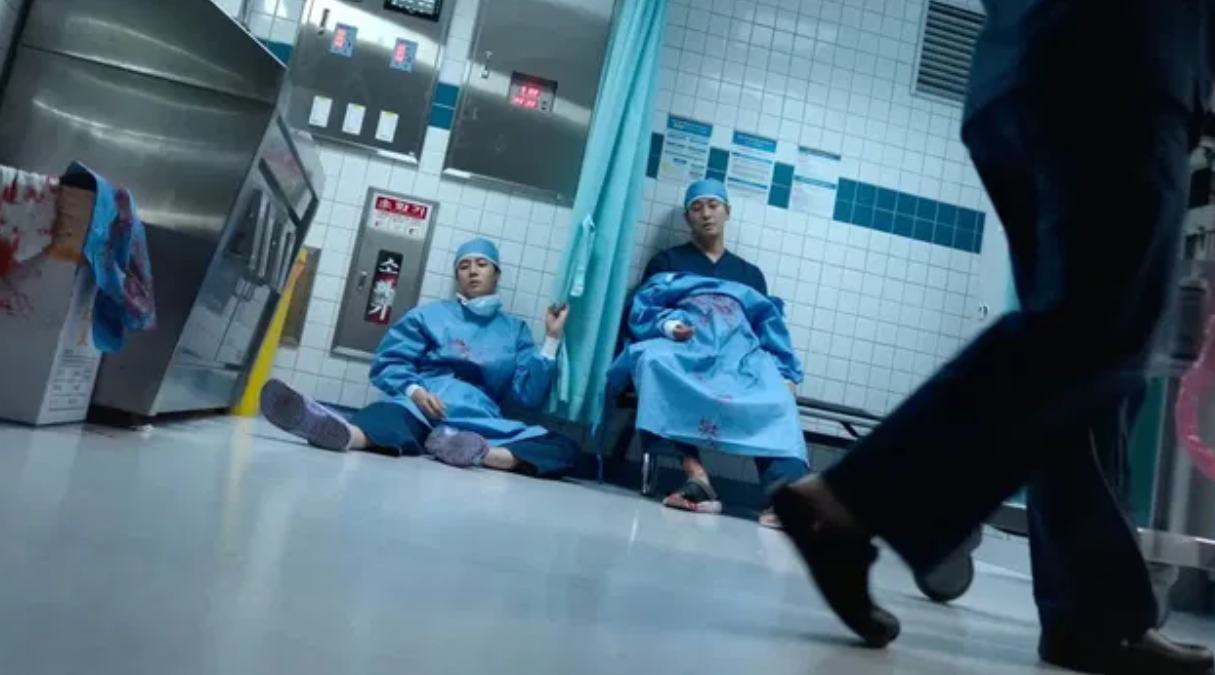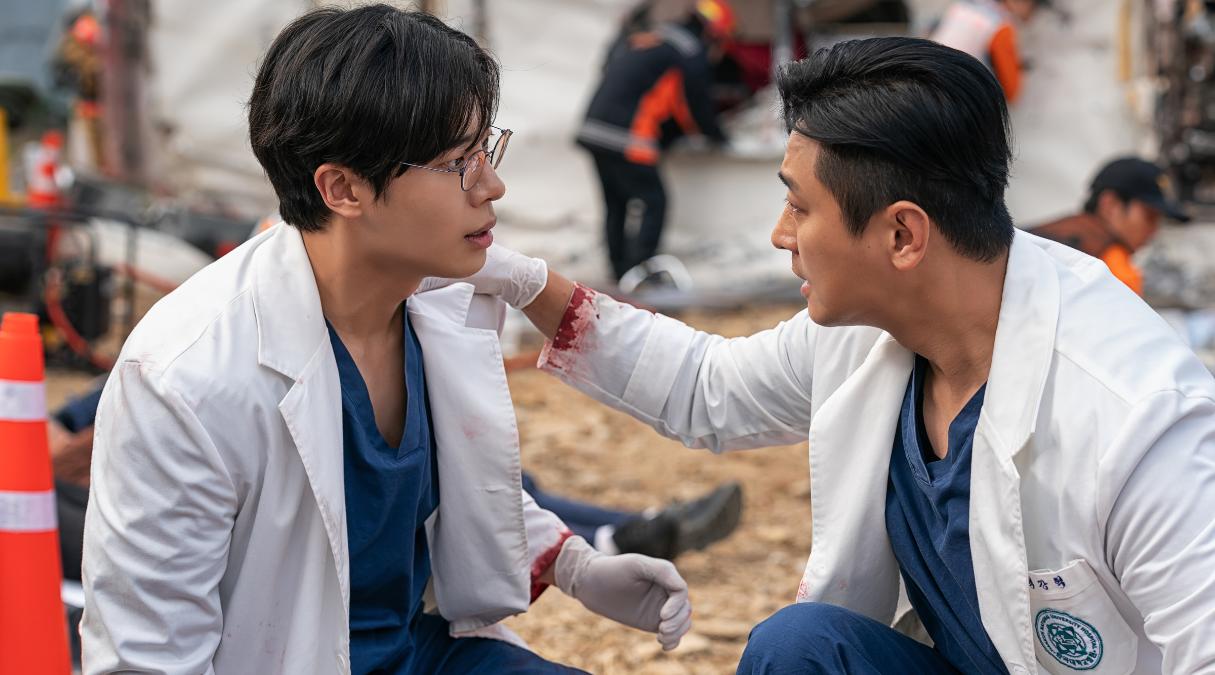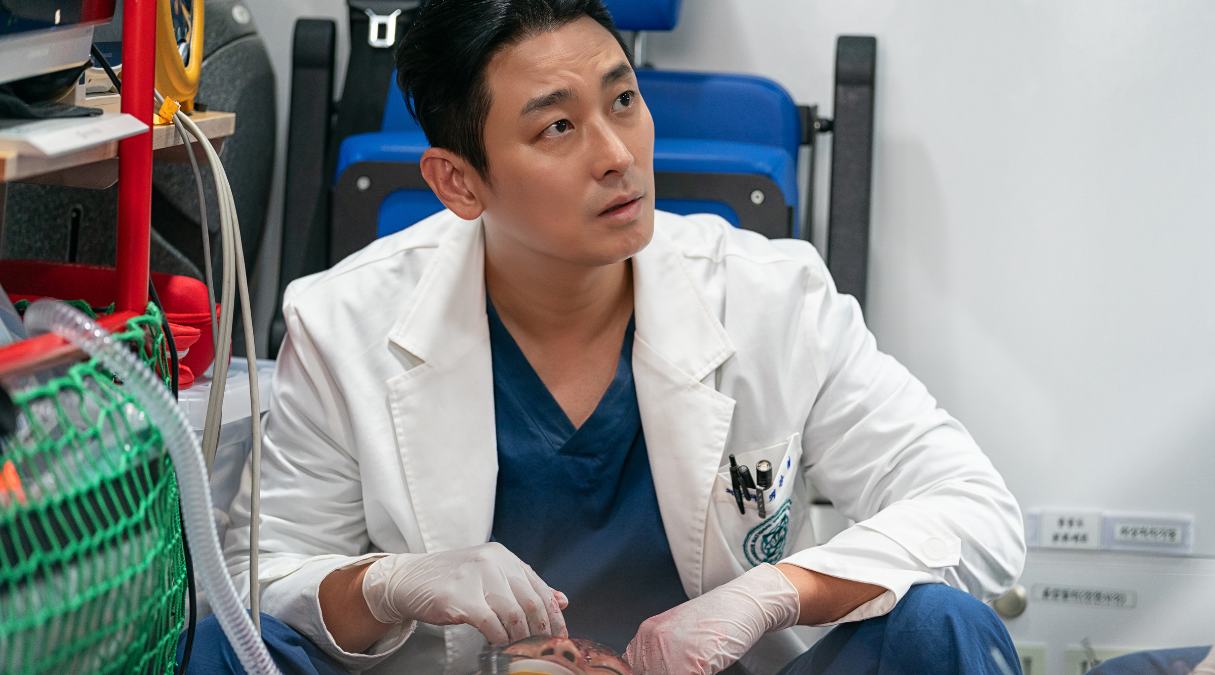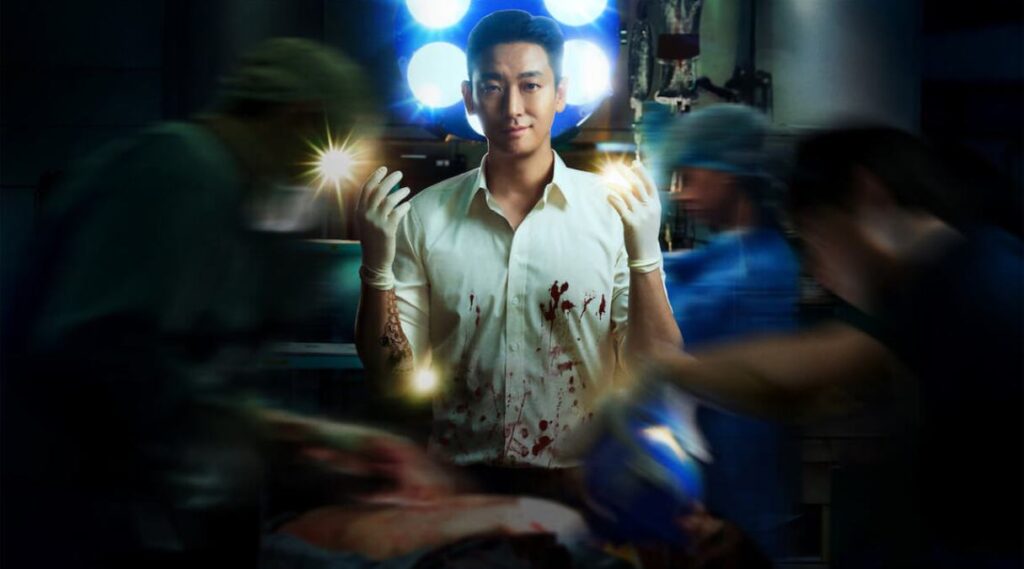Based on the web novel “Joongjeunguesangcenter: Golden Hour” by Hansanyiga, The Trauma Code: Heroes On Call embraces high-stakes medical melodrama with the edge only a man who has done emergency treatment as a combat medic can provide. Directed by Lee Do-Yoon, written by Choi Tae-Kang, and produced by WEBTOON Entertainment’s Studio N, The Trauma Code is another web adaptation that works perfectly in live-action.
The Trauma Code follows Dr. Baek Kang-hyuk (Ju Ji-Hoon, Hunt, Project Silence), a genius surgeon and former combat medic. Cool under pressure (and some would say thriving on it), Kang-hyuk is the best there is when it comes to treating traumatic injuries in South Korea or abroad. Having worked in conflict zones across the world, Dr. Baek keeps the pictures of his patient, reminders of the people he saved, and ultimately doesn’t lose his humanity despite being thrust into high-stakes situations over and over.
But some find his confidence is off-putting. Where others take time to think, Dr. Baek sees the minute that they let their patient slip out of the Golden Hour, the time after a traumatic injury in which a person’s life can still be saved. That confidence is like a bulldozer the moment he knows that he is doing the right thing. Forged in high-intensity situations, he doesn’t entirely care about what the protocol is or what those around him think. He makes the call.
Now back in South Korea, he takes a job at a university hospital in an attempt to breathe life into its emergency trauma center. A husk of a department, Dr. Baek has to rebuild the severe trauma team from mostly scratch and to the ire of the hospital’s chairman and board. The more he saves, the more money the hospital loses. To get the job done, Dr. Baek works with Nurse Cheon Jang-Mi (Shin Ha-Young, Doona!), who mistakes him for a gangster on his first say. Causing a dynamic where he calls her gangster, she calls him Boss, and it’s an immediate point of connection and understanding.
Medical melodrama is just one part of this new Netflix Kdrama’s formula.

After Nurse Cheon, Dr. Baek looks to get his first resident, Yang Jae-Won (Choo Yeong-Woo). Where Jang-mi is assertive and confident, matching Dr. Baek’s style, Jae-Won is a nervous wreck. When he meets Dr. Baek, he’s anxiety-ridden and a member of the proctological surgery department working under Professor Han Yoo-Rim (Yoon Kyung-Ho).
But when Dr. Baek sees him, Yang Jae-Won easily becomes his number one, even if he’s called Anus for their few weeks together. While Dr. Baek remains mostly the same character, The Trauma Code uses Resident Yang as an example of finding your calling in life and how to follow responsibility instead of running from it. To the Professor’s anger, of course. Rounding out the severe trauma team is anesthesiologist resident Park Kyung-Won (Jeong Jae-Kwang, The Worst of Evil, Nevertheless), who is called to the Trauma department when the others in his department refuse to do anything not scheduled on their board.
While most of the issues that American medical dramas and procedurals face are about our failing insurance system and inability to give anyone healthcare because of it, that’s not the case here. But this isn’t a grass is greener situation. The Trauma Code zooms in on the bureaucracy of hospitals in the South Korean healthcare system and the reality that the government manages trauma care through Regional Trauma Centers. Hospitals that work through corporate structures don’t always have trauma units, making in-the-moment care and decisions more difficult.
The Trauma Code: Heores On Call puts patients first and dissects the problems with hospitals.

The series, albeit hamfistedly, moves the viewer not just through the red tape and underfunding that can happen at devalued Regional Trauma Centers. The most significant issue of the series revolves around funding. As Dr. Baek strengthens the Trauma Center by saving more lives, the costs increase. The hospital chairman sees every life saved as an expenditure that needs to be zeroed out.
On call after call and meeting after meeting, the money the RTC uses is the primary topic, and Dr. Baek doesn’t care. He knows that the government funding is there, his team supports other teams across the hospital, and most importantly, saving patients matters more than any bottom line.
The guiding theme throughout The Trauma Code is that you have to save people. It’s not about thinking everything through so much as understanding that your insecurity and indecision can cost others their life. You can’t just kick patients off to the next hospital if you want to maintain your oath as a doctor and be a good person.
At times, the show’s melodrama comes into full focus and offers the audience a good laugh, thanks to its absurdity. But other times? It taps into the emotional highs that every good medical drama does; it asks you to feel for the patients and respect and care for the medical staff.
Dr. Baek may be a bulldozer, but his care for people outweighs everything.

While the series introduces us to different characters, the trio of leads that we spend the most time with are our lead Baek Kang-Hyuk and his mentee, Yang Jae-Won – who is called Anus or Number One for the bulk of the series. The two work extremely well off of each other. Their chemistry as mentors and mentees is essential to The Trauma Code‘s emotional success.
They’re not so much mirrors of each other as they are one person at two different times in their lives. The way that they’re able to butt heads, back each other up, and ultimately grow with each other makes Dr. Baek and Jae-won a perfect duo.
This isn’t to say that Nurse Cheon Jang-Mi, anesthesiologist resident Park Kyung-Won, or even Professor Han Yoo-Rim aren’t great. They round out the cast with comedy and empathy. Kyung-Won explicitly has moments to shine when submitting more extensive commentary about hospital staff. For her part, Jang-Mi is the perfect counterweight to Dr. Baek’s abrasive bulldozing style. But her kindness is just her bedside manner; she’s extremely competitive and driven as well; she just knows that you can catch more bees with honey than vinegar.
As for the professor? Well, he stands for everything that Dr. Baek hates about the hospital system. He’s too safe, too focused on securing notoriety and money, and not invested enough in just saving his patients. Professor Han is the character who acts as the stand-in for the establishment, and how Baek interacts with him showcases how he plans to move the hospital system forward with his work.
Ju Ji-hoon thrills as Dr. Baek in this medical Kdrama.

As for Dr. Baek, Ju Ji-hoon is everything. He has the right amount of confidence, caring, and, more importantly, the exact amount of a bulldozer. While he seems cold in his determination, when he lets himself be vulnerable, you can see how deeply he cares for his patient. He runs everywhere, knowing that every minute counts and people rely on him and his team.
His anger when people are slow or can’t make decisions doesn’t come from a place of malice but from a need to save people. Dr. Baek is a good man, a kind man impacted by his past, trying to have everyone run with him instead of leaving them behind. He always moves purposefully, and the passionate performance that actor Ju brings to Dr. Baek seals the deal. Sure, Dr. Baek has the typical swooning shots that make him fit for a Kdrama lead in a three-piece suit, but his passion keeps you locked in and rooting for him, even when doubt is cast in his direction.
Then, there are, of course, the “case of the episode,” medical emergencies that the Trauma Team attends to. Each one feels like a massive moment, either because of a large disaster or because of a ripple effect it carries throughout the hospital. The series captures these moments of absurd medical issues and reports with a more grounded approach than what you would see in today’s era of Grey’s Anatomy. That said, the series never skips on the melodrama.
The Trauma Code: Heroes On Call is eccentric in the right ways but manages to keep its message at the center. It highlights the vital job that doctors play. Still, more importantly, it breaks down the ivory tower that the bottom line maintains and highlights the importance of holding onto your ideals as you grow, no matter what you go through. As a series, The Trauma Code has given me one of my favorite doctors in a long time.
The Trauma Code: Heroes On Call is streaming exclusively on Netflix on January 24, 2024.
This review follows episodes 1-4 and will be updated when the embargo on 5-8 lifts.
The Trauma Code: Heroes On Call
-
Rating - 8/108/10
TL;DR
The Trauma Code: Heroes On Call is eccentric in the right ways but manages to keep its message at the center. It highlights the vital job that doctors play. Still, more importantly, it breaks down the ivory tower that the bottom line maintains and highlights the importance of holding onto your ideals as you grow, no matter what you go through.







